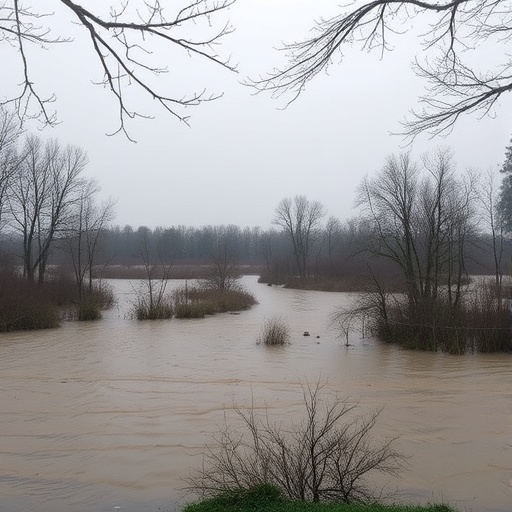In a groundbreaking study led by researchers Han, Merz, and Nguyen, the complexities surrounding the occurrence of unprecedented floods have been explored through a novel approach that reanalyzes historical precipitation data and previous catchment conditions. Flooding has become a critical concern worldwide, particularly as climate change intensifies extreme weather events. Scientists have long sought to understand the triggers of floods to better inform disaster management strategies and resilience planning. This recent investigation provides insights that could change how we comprehend and prepare for such natural disasters.
The study reveals that past precipitation events, combined with the hydrological states of catchments prior to these occurrences, play a significant role in predicting and understanding flood events. By employing advanced analytical methods, the researchers were able to synthesize historical data with current models, effectively creating a framework that bridges our understanding of past events with modern challenges. This approach offers a lens through which we can view the interactions between various climatic and hydrological factors that contribute to flooding.
One of the primary challenges in flood prediction has been the traditional methods that overly simplify the relationships between precipitation, catchment conditions, and flood events. Often, these models fail to consider the cumulative effects of preceding rainfall and the state of the catchment’s soil moisture. By integrating historical rainfall patterns with current catchment conditions, the researchers argue that more accurate flood forecasts can be developed, potentially leading to earlier warnings and better preparedness measures.
The methodology employed in this research is indicative of a shift toward more complex, data-driven approaches in environmental science. Utilizing historical records of precipitation coupled with real-time monitoring of catchment states, the combination of these data sets allows for a more nuanced understanding of how floods emerge under varying conditions. The research team harnessed a mix of machine learning algorithms and hydrological modeling to achieve their objectives, highlighting the importance of technological advancements in this field of study.
Moreover, the implications of this research extend beyond the realm of academic curiosity; they hold practical applications for urban planning, agriculture, and water resource management. By providing tools that improve flood risk assessments, municipalities and governments can develop more effective mitigation strategies. For instance, the ability to anticipate flooding risks in urban areas can lead to better drainage systems and emergency response plans, ultimately saving lives and reducing economic losses.
The researchers also acknowledged the role of climate variability and change in altering precipitation patterns and catchment responses. As the impacts of climate change become more pronounced, understanding these new dynamics is crucial for adapting our flood management strategies. The findings highlight the necessity for ongoing research that can capture the evolving nature of weather patterns and their influence on hydrological responses.
In discussing the societal implications of their findings, the authors emphasized the urgency of addressing flood-related vulnerabilities. Regions that are prone to flooding often lack the infrastructure necessary to cope with extreme weather events, exacerbating their exposure to disaster. The innovative techniques developed through this research could assist in prioritizing investments in infrastructure improvements, targeting areas that are most at risk.
Public awareness is another integral aspect of flood preparedness that this research touches upon. Communicating scientific findings to the public in an accessible manner is vital for fostering a culture of preparedness. The integration of historical and contemporary data not only serves as a scientific advancement but also as a means to enhance community understanding of flood risks and appropriate responses.
As the study progresses, the researchers plan to extend their work to encompass more geographical regions and a wider variety of hydrological conditions. This expansion will allow for a comprehensive understanding of flooding across different landscapes, helping to establish universally applicable strategies for flood management. The goal is to create a robust framework that can be adapted to various climates and socio-economic contexts, enhancing global resilience against flooding.
The engagement of local scientists and communities will also be essential in the development of this research. Collaborating with those who have first-hand experience with flooding can provide invaluable insights and enhance the relevance of scientific findings. Incorporating local knowledge will ensure that the approaches suggested by researchers are realistic and applicable within specific contexts.
In conclusion, the study by Han et al. signifies a crucial step forward in flood-related research, blending innovative data analysis techniques with traditional hydrological understanding. As floods become increasingly common due to climate change, it is imperative that scientific research continues to evolve, adapting to the ongoing changes in our environment. The combined efforts of the scientific community, policymakers, and the public will be required to develop effective flood management strategies that can safeguard vulnerable populations and infrastructures.
The breakthroughs presented in this research can pave the way for rigorous and proactive flood management approaches. As we navigate the challenges posed by climate change, studies like this one will be pivotal in transforming our understanding and response to flooding, ultimately fostering a more resilient and informed society.
In summary, the insights generated from reanalyzing previous precipitation events combined with catchment states carry significant implications for flood prediction and management. The continued pursuit of research in this domain promises to unveil more effective strategies that are crucial for mitigating the impacts of flooding on communities worldwide.
Subject of Research: Flood prediction through the analysis of previous precipitation events and catchment states.
Article Title: Recombining past event precipitation and antecedent catchment states generates unprecedented floods.
Article References:
Han, L., Merz, B., Nguyen, V.D. et al. Recombining past event precipitation and antecedent catchment states generates unprecedented floods. Commun Earth Environ 6, 692 (2025). https://doi.org/10.1038/s43247-025-02691-6
Image Credits: AI Generated
DOI: 10.1038/s43247-025-02691-6
Keywords: Flood prediction, hydrological modeling, climate change, catchment states, precipitation analysis.




